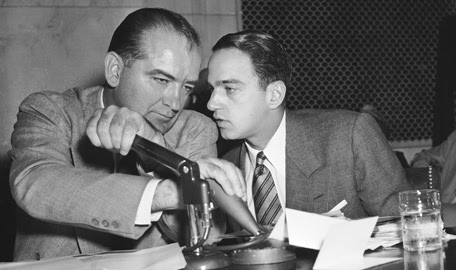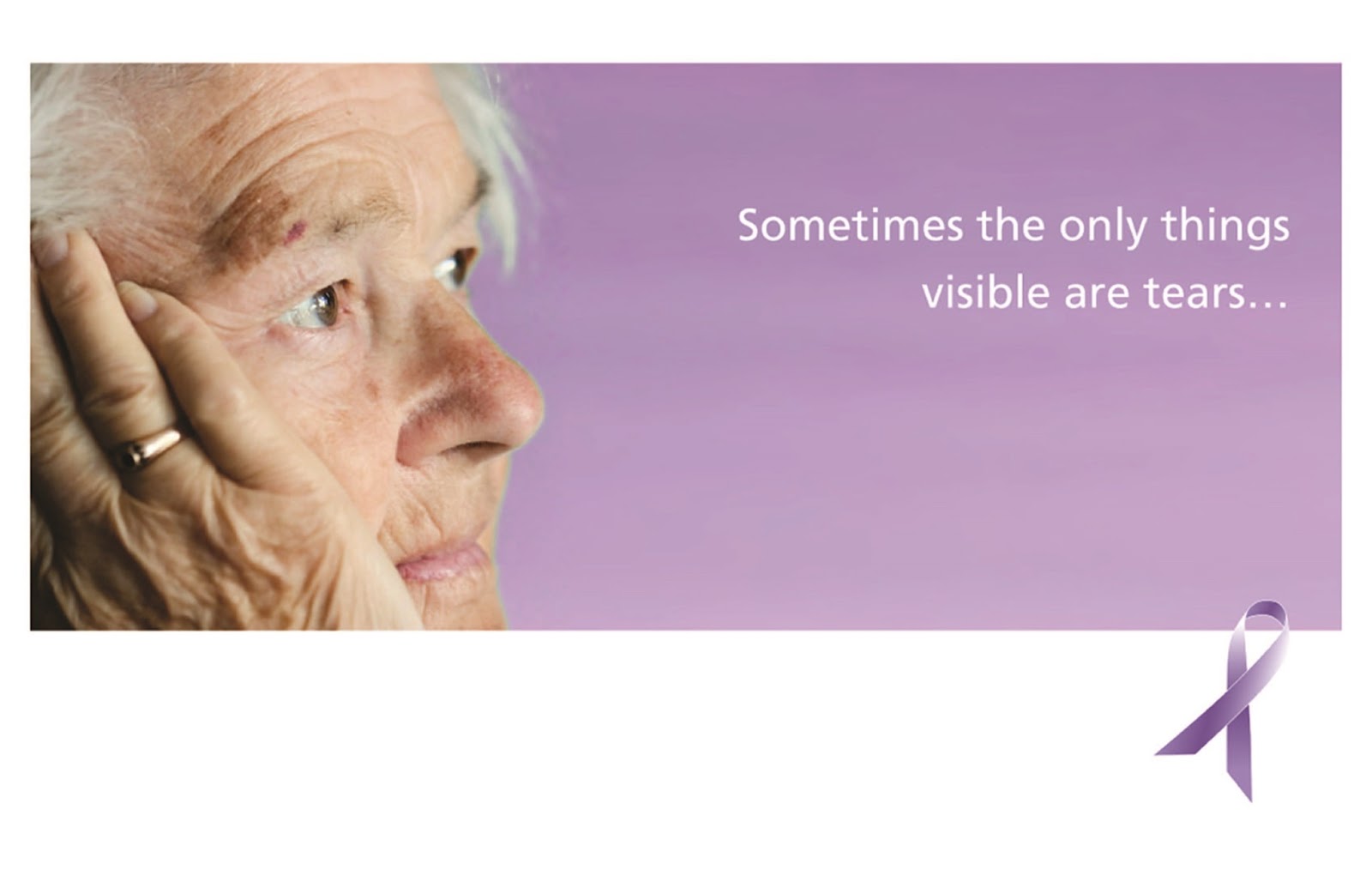 |
| McCarthy and assistant Roy Cohn during the hearings |
On 9
June 1954, in a packed Senate Caucus Room in Washington, D.C., televised live
to 80 million Americans, a historic subcommittee hearing was reaching its
climax. Senator Joseph McCarthy was
taking his anti-communist crusade to the United States Army. Beginning on 17 April, the hearings had been
broadcast in their entirety, and, 30 days in, a now famous exchange took place between
McCarthy and Army special counsel Joseph Welch.
McCarthy, who had been revealed as a crude bully, repeatedly shouting “point
of order” to cut off people when he didn’t like what they had to say, irrelevantly
revealed that a member Welch’s staff had been a member of the National Lawyers’
Guild, the only lawyers willing to defend those accused of being communists during
the period. Welch responded by calling McCarthy
“reckless and cruel”, asking “have you no sense of decency, sir?” Welch’s response was met with cheers from the
gallery.
Though
they concluded no wrongdoing on his part, the Army-McCarthy hearings are widely
perceived to mark the beginning of Joe McCarthy’s downfall. The junior Senator from Wisconsin had first come
to prominence in February 1950, when he made a speech in which he claimed to
have the names of numerous individuals in the State Department “who would
appear to be either card carrying members or certainly loyal to the Communist
Party.”[1] McCarthy’s claim made headlines, and despite a
Senate Committee concluding that none of the names on McCarthy’s list had links
with the communist party, he became a household name in America. Having assumed the chair of the Senate
Permanent Subcommittee on Investigations in 1953, McCarthy was able to widen the
target of his attacks, holding 169 hearings throughout 1953 and 1954. Taking on the US Army proved to be a step too far, however. Following the Army hearings, McCarthy was
censured by the Senate in December 1954 and in January 1955 lost his position
as the Subcommittee chair. His influence
declined from this point onwards until his death in 1957.
Surveillance
by official bodies is by no means a 21st century phenomenon. Whilst McCarthy leant his name to the age of
McCarthyism, his activities constituted only a fraction of the anti-communist movement
in the US, which had begun in the 1940s.
As World War II ended and the Cold War began, the communist threat posed
by the Soviet Union, and subsequently China, to the American way of life became
a major concern for the US government.
The prominent convictions of Alger Hiss, Klaus Fuchs and the Rosenbergs
on espionage charges served only to fuel the American people’s paranoia. In the name of protecting the US from this
threat, the House Un-American Activities Committee (HUAC) and the FBI, under
the directorship of J. Edgar Hoover, conducted widespread surveillance of US
citizens and thousands were added to blacklists which ended their careers.
 There
are no longer reds under the beds.
Nowadays the bogeyman is not the communist but the terrorist. Contrary to the popular view of McCarthyism,
many of those accused were, or had been, members of the Communist Party. Many had links to the Soviet Union. Whether or not they can be deemed to be
‘innocent’ victims depends on your view of communism. In advocating the overthrow of the
government, communists would doubtless argue that their actions are intended
for the betterment of mankind. Doubtless
fundamentalist terrorists would argue this too.
The crucial difference for the average citizen is that terrorism directly
threatens their lives and communism does not.
There are a large number of people in the UK who probably feel that not
voting for the Tories was their contribution to the betterment of mankind. Does that give the government
the right to label them a subversive threat and monitor their communications?
There
are no longer reds under the beds.
Nowadays the bogeyman is not the communist but the terrorist. Contrary to the popular view of McCarthyism,
many of those accused were, or had been, members of the Communist Party. Many had links to the Soviet Union. Whether or not they can be deemed to be
‘innocent’ victims depends on your view of communism. In advocating the overthrow of the
government, communists would doubtless argue that their actions are intended
for the betterment of mankind. Doubtless
fundamentalist terrorists would argue this too.
The crucial difference for the average citizen is that terrorism directly
threatens their lives and communism does not.
There are a large number of people in the UK who probably feel that not
voting for the Tories was their contribution to the betterment of mankind. Does that give the government
the right to label them a subversive threat and monitor their communications?
The
leaks about the NSA PRISM programme released over the last month have stirred
up arguments about the right to privacy and the nature of surveillance carried
out by the government. On the surface it
would seem reasonable to argue that openness can only be good for a society, if
it prevents more expenses scandals, regulatory body cover-ups and police smear
campaigns. Openness is the key to
combatting corruption. As McCarthyism
teaches us, we enter dubious moral territory when those in power are left to
their own devices to decide who constitutes a threat to the government.
On the
other hand, we understandably rely on our governments to keep us safe. In his defence of PRISM, Obama argued that we
“can’t have a hundred per cent security and also then have a hundred per cent privacy and zero inconvenience”,
I am
undecided as to whether Edward Snowden is a champion of civil liberties or simply
a nobody seeking notoriety. Everybody
likes a guy who knows a secret and despite our apparent outrage we have an
insatiable appetite for government conspiracy theories. But, traitor or not, Snowden’s actions have
certainly highlighted the need for serious debate on this topic.
If
there is a lesson to be taken away from all this it is that our privacy laws are outdated and desperately
need reviewing in order to catch up with developments in electronic
communication. To say that we should not
expect anything on the internet to be private ignores the fact that huge
portions of our lives are lived online nowadays, from banking, to shopping, to
passport applications. We would not
expect our post to be intercepted and read and our electronic communications
should be treated with the same respect.
There is a difference between
that which we choose to make public, our Twitter posts for example, and those
communications (emails, text messages) which are intended for specific
recipients. The law has not caught up
with technology and it badly needs to.
Unfettered, warrantless access to our emails, internet browsing history
and mobile phone records is completely disproportionate. Under existing legislation in the UK the
police can demand communications data for terror and serious crime suspects,
and these powers have been widely used already.
Judicial oversight can be given to accessing electronic communications
without compromising our security, in the same way a search warrant can be obtained
to enter a suspect’s house.
I am
more than happy for my government to develop the tools to keep me safe from
terrorists in the cyber age, but as the excesses of McCarthyism demonstrate,
the abuse of power is not purely the purview of totalitarian states. This is a universal truth that can be
transposed from phone tapping in the 1950s to email hacking in the 2010s. The solution is an urgent review of
legislation accompanied by robust regulation; terrorists will not be defeated
by the creation of a police state. Sending
back the McCarran Security Act in 1950 (a veto which would be overridden by
Congress), President Truman wrote that “we will destroy all that we seek to
preserve, if we sacrifice the liberties of our citizens in a misguided attempt
to achieve national security.”[2] The leaders of the ‘free world’ should take
note.





